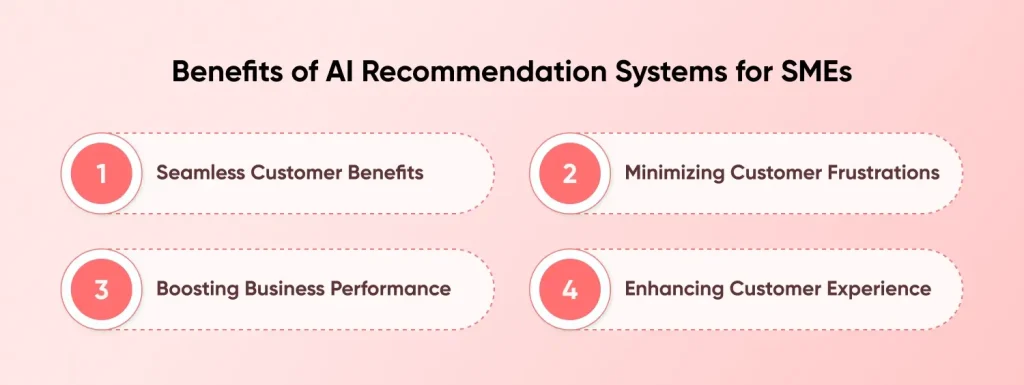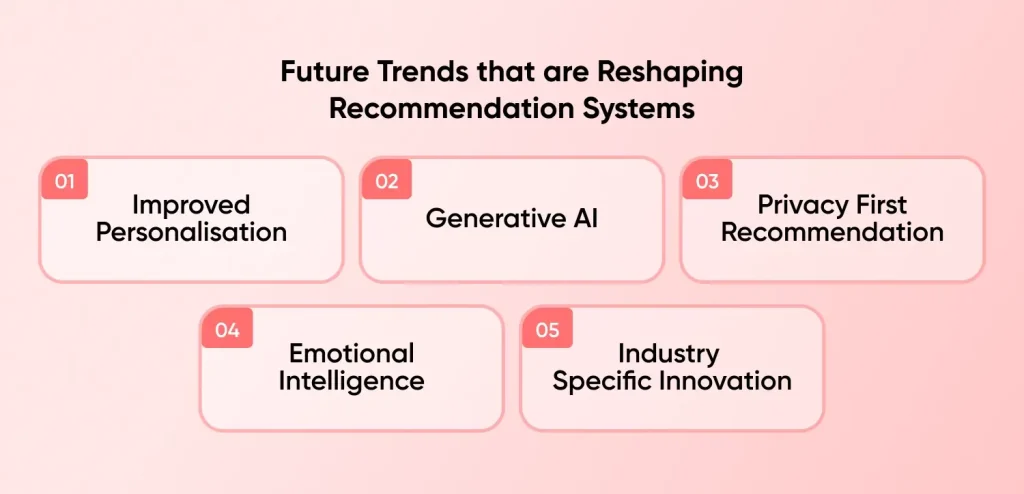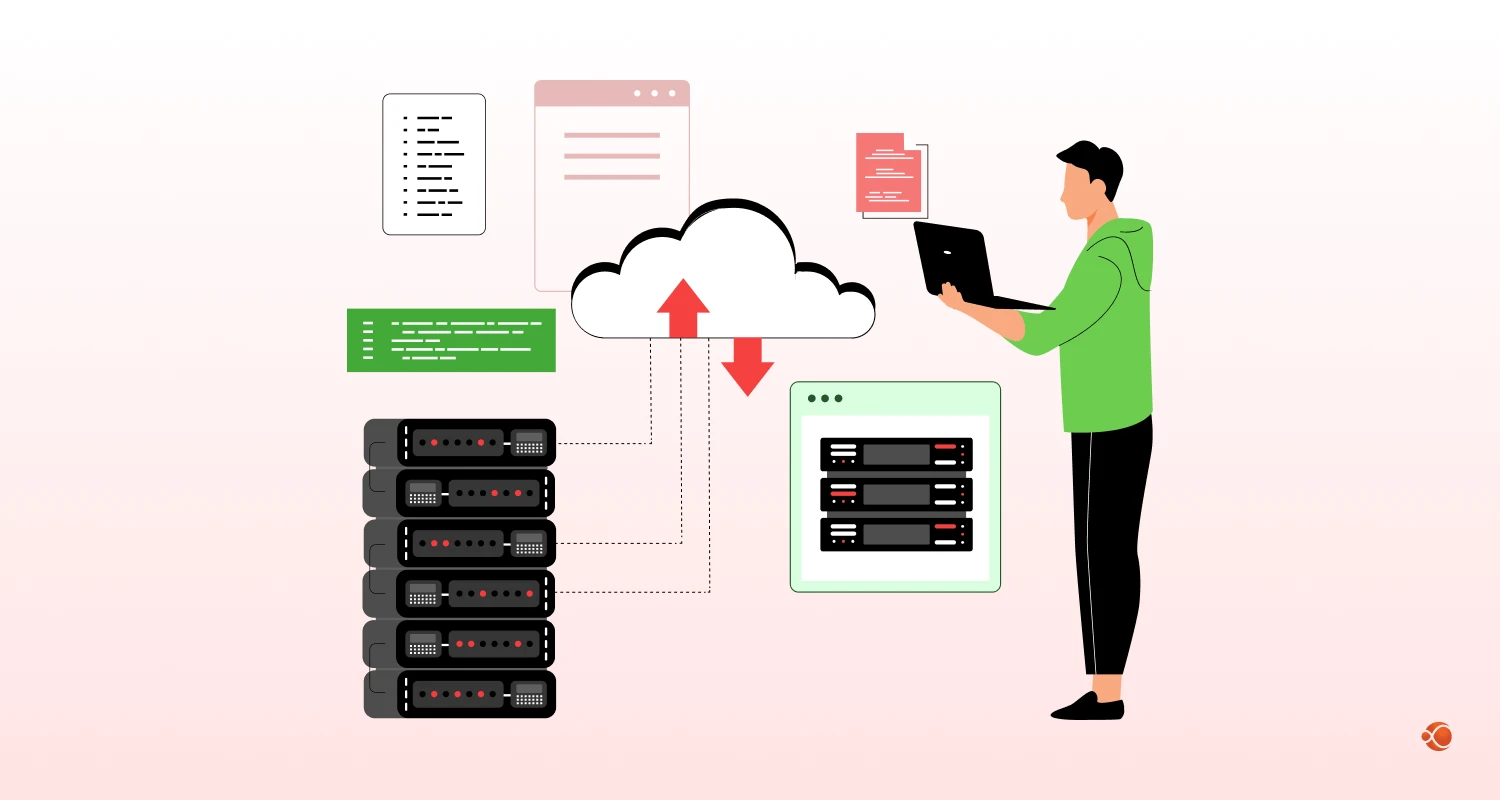The technology of the internet has transformed the way we shop online, and with the vast availability of options, the selection process has become tiring and frustrating. On the other hand, a challenge is posed to businesses to sell more products at a higher price than their competitors. One solution is to use an AI based recommendation system to give personalized recommendations to customers.
In today’s data-driven landscape, recommendation systems have emerged as an excellent tool for enhancing customer experience. While big companies like Amazon, Spotify, and Netflix are leveraging AI recommendation systems, along with them, mid-sized companies are also increasingly adopting this technology to grow their business and remain competitive in the market.
Whether it is a streaming service, e-commerce, or any other sector, an AI recommendation system plays an important role in the success of the platform. This blog explores how mid-market businesses can successfully implement AI recommendation systems through real-world case studies and practical implementation strategies.
Understanding the AI Recommendations System
Before we get deeper into the strategies, let’s first understand what a recommendation engine for mid-market companies is and how it works. So, at a basic level, a recommendation system analyzes users’ behaviour, preferences, and other related data points to give them a personalized recommendation of products and services, or content that the users might find appealing. Many companies choose to hire AI Developers to design, build, and optimize these systems for maximum personalization and business impact.
An artificial intelligence recommendation engine uses ML algorithms that are trained to rank or rate the product or content that users interact with. And it is designed to predict the ratings the user might give to a specific item and return those predictions to users in a ranked list. This technology is used by many companies. For instance, Spotify may recommend songs based on users’ previously listened or liked songs.
Why do Mid-sized Companies need an AI Recommendations System?
Mid-sized companies are usually defined as businesses that have a revenue between $10 million and $1 billion, and an AI recommendation system offers them strategic advantages:
- Increasing average order values through relevant cross-selling and upselling
- Enhancing customer retention by delivering personalized experiences
- Optimizing inventory management by predicting demand patterns
- Reducing decision fatigue for customers by curating personalized options
Types of AI based Recommendation Systems
There are certain types of AI recommendation systems as given below, and with the rise of advanced models, Generative AI Solutions are now being integrated further to enhance the creativity and adaptability of these platforms.
Content-based System
In this system, it recommends items based on users’ preferences and things that they have liked previously. Content-based models focus on the ratings provided by the users; these models establish the level of similarity based on the attributes liked by users. It is particularly advantageous when the ratings data are insufficiently available, as they can leverage the ratings and item attributes to give a personalized recommendation.
An example of a content-based system is Amazon, which suggests products to users based on the products previously bought by the users.
Collaborative Filtering System
Collaborative filtering is used in AI recommendation systems, where the preferences and interests of users are predicted based on the data of multiple users. The whole idea behind collaborative filtering is that if two users have a similar taste in one product, then there is a high chance that they will have similar tastes in other products as well. The recommender algorithm is advantageous, easy to implement, and captures subtle characteristics without requiring full knowledge of an item.
For instance, YouTube’s content is recommended to users based on similar videos.
Knowledge-Based System
A knowledge-based system generates recommendations based on users’ needs and domain expertise. Unlike a content-based approach, this system doesn’t rely on users’ past behaviours and preferences, but it takes help from other expert sources or attributes of customers for products and services. One advantage of knowledge-based recommendation is that it makes it easier for a user to understand why such a recommendation was made.
One such example is eBay, which uses a knowledge-based approach for recommending products in categories like luxury goods, collectibles, or antiques, where preferences like rarity, authenticity, or material play a critical role.
Hybrid Recommendation System
A hybrid recommendation system was designed to remove the limitation of individual recommendation systems by combining multiple data sources, which is achieved through two ways: parallel and sequential. In a parallel recommendation system, multiple designs are used in parallel to generate recommendations, and their output is combined to produce the final outcome. And in a sequential system, a single recommendation engine is used in sequential order, and it is passed to the next recommender in sequence.
One of such AI recommendation system examples can be Netflix. It uses multiple recommendation systems, like content, knowledge, and collaborative filtering, to recommend top content to stream.
For organizations interested in building recommendation engines, it’s important to evaluate which type (content-based, collaborative, knowledge-based, or hybrid) aligns best with your business objectives and available data.
Benefits of AI Recommendation Systems for SMEs

Seamless Customer Benefits
All the customers nowadays expect a seamless experience across all the channels; that’s why omnichannel marketing has become increasingly popular. An AI-powered recommendation plays an important role in ensuring consistency across all the channels by collecting and utilizing the data from customer interactions on different channels.
For example, if a customer searches for a product on a website, then that data can be used for recommendations through email or other channels to maintain consistency. Many organizations rely on specialized Machine Learning App Development Services to ensure their recommendation engines are robust, scalable, and customized to their unique needs.
Minimizing Customer Frustrations
Nowadays, customers have a limited time span, and they get frustrated easily with irrelevant content or product recommendations, which can lead to a negative customer experience and loss of revenue. An AI-based recommendation can help in minimizing the risk of frustration by filtering and giving personalised recommendations. By giving a personalized recommendation, customers’ interaction will increase and eventually sales and revenue of the business.
Boosting Business Performance
All the business owners wish to increase average order value and achieve high sales, and ultimately boost the business performance. Using an AI-powered recommendation system will increase the chances of a product purchase. It will increase up-skilling and cross-selling strategies, also making the buying process smoother and convenient for customers. With the help of AI consulting services providers, you can seamlessly integrate a recommendation system into your business operations for better revenue and growth.
Enhancing Customer Experience
Personalization is important for improving customer experience, and an AI recommendations system helps in achieving it. And as per Epsilon’s research report, 80% of customers preferred to purchase from brands that give a personalized experience. This indicates that personalisation can be significantly competitive for businesses seeking to improve customer satisfaction.
Implementation of AI Recommendation Systems by Mid-Sized Companies
Case Study 1: Wayfair Boosts Online Sales Through Personalized Recommendations
Wayfair is a Boston-based e-commerce company that specializes in home goods and furniture. Though it has become a large company, it was previously a mid-sized company. It has leveraged an AI recommendation system to fuel its growth.
Challenges- With a million products from over 23000 suppliers, Wayfair needed to help its customers through easy navigation. There was an overwhelming number of options to find a product matching their style and preference, which resulted in poor conversion rates.
Solution- Wayfair analyzed customer browsing behavior, purchase history, and style preferences. And created visual similarity algorithms to recommend products with aesthetic consistency.
Case Study 2: Boxed.com Revolutionizes Bulk Shopping with Smart Recommendations
Boxed.com is a New York-based e-commerce company that delivers bulk-sized groceries, health supplies, and household products. Founded in 2013, Boxed has grown into a large company.
Challenges– Not like traditional grocery stores, where the customers browse different aisles. Boxed wanted customers to discover the products they don’t know they need, and encourage repeat purchases.
Solution- They personalize recommendations based on household size and composition. It also predicts that customers will likely run out of products based on purchase history and consumption patterns.
Case Study 3: Stitch Fix Personalizes Fashion Through Data Science
Stitch Fix is a San Francisco online personal styling service based company that uses a combination of human stylists and data science to recommend clothing items to customers. Stitch Fix’s approach is an excellent example of how companies can build AI-powered web apps with MERN Stack to efficiently process customer data, deliver personalized recommendations using AI, and scale as their customer base grows.
Challenges – Fashion is subjective, personal, and preferences. Stitch Fix needed to solve this style-matching problem by understanding individual preferences and translating them into a specific product recommendation from their inventory.
Solution – Created a detailed style profile for each customer based on preferences and feedback. And developed algorithms to understand fit issues and style preferences.
Case Study 4: Chewy Enhances Pet Owner Experience Through Smart Recommendations
Chewy is an online retailer of pet food and pet related products that are based in Florida. It was founded in 2011 and it has turned into a leasing e-commerce platform for the pet industry.
Challenges – Pet owners have different needs as per pet type, breed, age, and health conditions. Chewy needed to predict these needs and create personalized shopping experiences that would increase customer lifetime value.
Solution -They have created a detailed pet profile to generate a targeted recommendation. They have also used image recognition to identify pet breeds from customer-uploaded photos.

AI Implementation Strategy for Mid-Market Enterprises
Based on the above case studies of AI in mid-sized businesses here are practical strategies for mid-market companies looking to implement an AI recommendation system:
Start with a Clear Business Objective
The start of any successful recommendation system implementation is with well-defined business objectives. Mid-market companies should resist the temptation to implement AI technology and focus on specific business challenges that a recommendation system can solve.
Whether you are trying to increase average order value, improve customer retention, or enhance operational efficiency. And identify the KPIs (key performance indicators) that are directly linked to revenue. This will help in justifying the investment in the recommendation system.
Take Inventory of Data Assets
An AI based recommendation system requires quality data to function effectively, making an assessment of the existing data assets essential before beginning to implement. Mid-market companies should evaluate what customer data they already collect and identify gaps in data collection processes after that they must assess data quality.
Boxed.com exemplifies this approach by initially leveraging purchase history data they were collecting before expanding to more sophisticated consumption pattern analysis. Starting with existing data accelerates time-to-value and provides the foundation for more advanced capabilities later.
Choose the Right Implementation Model
Mid-market companies face an important decision about how to implement an AI recommendation system. They have a wide range of options, from building a custom solution to purchasing off-the-shelf recommendation engines to partnering with a specialized vendor. For most mid-market companies, a customized existing solution offers the best balance of cost, speed, and performance.
Companies should evaluate potential implementation partners based on their experience with similarly sized businesses and understanding of industry-specific issues.
Begin with Small and Scale Gradually
An AI recommendation system is implemented by following a phased approach that allows mid market companies to prove value quickly while minimizing risk. Start with a limited product set or customer segment and gradually expand functionalities based on measured results. Consider implementing an AI based recommendation system in a single channel before expanding to others.
Chewy’s implementation strategy is a good example of this approach, as they began with basic pet profile recommendations before expanding to more sophisticated suggestions and eventually to healthcare recommendations. This incremental approach maintains momentum while making sure each expansion phase delivers measurable value.
Balance Automation with Human Control
The AI-based recommendation system works right when it augments rather than replaces human judgment. Mid-market companies get an AI recommendation system designed in such a way that includes feedback mechanisms for continuous improvement. Create a cross-functional team including both business stakeholders and technical staff to regularly review recommendation performance to ensure the system continues to align with business objectives while maintaining the human touch that many customers value.
Addressing Privacy Regulations
As the AI recommendation system processes a huge amount of customer data, mid-market companies must navigate data privacy regulations like CCPA and GDPR. These regulations meet customers’ expectations regarding data usage and avoid potential biases in recommendation algorithms. Also, implementing transparency measures that help customers understand how recommendations are made and how their data will be used builds trust and compliance.
For a market, companies showing respect to customers’ privacy concerns can become a competitive advantage that distinguishes them from larger competitors.
Platforms used for an AI Recommendation System
Several platforms have emerged to specifically address the AI recommendations system needs of mid-market companies:
| Platform | Key Features |
| Reco.ai | Ultra-fast real-time recommendations |
| Handles cold start with real-time analysis | |
| Coveo | AI-powered personalized recommendations as per users’ profiles |
| Faceted search with filtering options | |
| SAS Viya | Cloud-native end-to-end AI and analytics |
| Operational decision automation | |
| Cloudera Platform | Production-grade AI inference service |
| Model lifecycle management and versioning |
Reco.ai
Reco.ai is a modular API for AI-based recommendations that offers flexibility and scalability to mid-market companies. Its API first approach lets businesses integrate recommendation capabilities into existing systems without a massive redesign.
Coveo
It is originally used to target enterprise clients, but it has adapted its AI-powered search and recommendation platform for mid-market companies. They provide powerful recommendation algorithms with an intuitive interface that doesn’t require specialized data science expertise.
SAS Viya
SAS Viya is an advanced analytical platform that includes machine learning capabilities, making it a strong choice for machine learning for mid-market companies that want to deliver personalized recommendations at scale. And it is an ideal platform for mid-market companies because of its sophisticated algorithms with approachable implementation requirements.
Cloudera Platform
It provides data management, machine learning tools, and recommendation system capabilities that grow with the business. Cloudera has an open architecture that makes it particularly valuable for companies with existing data infrastructure.
Future Trends that are Reshaping Recommendation Systems

The AI-based recommendation is continuously evolving with emerging technologies that were once an augmented thought are now a reality. For mid-market companies, these developments represent an opportunity to deliver customer experiences that are offered by enterprise-level companies.
Improved Personalisation
Gone are the days when simply the purchase history was used to give a personalised experience. Systems now analyze hundreds of data points simultaneously, like purchase frequency, browsing history, behaviour pattern, and even external factors. Modern platforms adjust as the users interact with the content.
Generative AI
The integration of generative AI has revolutionized the recommendation system. Platforms use GPT models for creating personalised product descriptions as per the individual customers’ needs. With a conversational recommendation, customers get interactive shopping assistants that engage customers for a better need understanding.
Privacy First Recommendation
With growing concerns about privacy issues, AI recommendation systems are being adapted to use less data. It uses advanced encryption AI algorithms to protect users’ information while maintaining personalized recommendations.
Emotional Intelligence
Recommendation systems are designed to analyse text, voice patterns, and even facial expressions to gauge emotional response. Changes in recommendations based on detected users ‘ frustrations and engagement.
Industry Specific Innovation
AI recommendation systems are expanding beyond their traditional applications. Like in the healthcare sector, it suggests preventive measures based on the patient’s health history and medical reports. And in the education sector, it provides recommendations of e-learning content based on skills gap and learning style. Similarly, an AI recommendation system is used in different industries as well.
The future of the recommendation system is not just about algorithms; it’s about creating a personal experience. By carefully implementing the emerging capabilities, they would be able to deliver an exceptional customer experience.
Why CMARIX is the Best Choice for AI Recommendation Systems in Mid-Market Companies
Implementing AI recommendation systems requires not just the right technology, but the right company. CMARIX stands out as the ideal choice for mid-market enterprises looking to harness the power of AI-driven recommendations without the enterprise-level complexity and cost. CMARIX has developed specialised tools and platforms across various industries that benefit from the recommendation system.
Concluding Lines
AI recommendation systems have evolved from luxury capabilities for enterprise companies to essential tools for mid-market companies. All those who wish to compete in an increasingly personalized business landscape recommendation system are helping out. AI technologies are combined with more accessible implementation options, creating a perfect opportunity for mid-market businesses to improve customer experiences, boost sales, and streamline business operations through an intelligent recommendation system.
For mid-market companies ready to begin their journey of an AI recommendation system, the path is clear: start with well-defined business objectives, leverage existing data assets, choose implementation approaches that match your technical capabilities, and scale gradually based on measured results. Consider working with an artificial intelligence development company to get competitive advantages through effective AI recommendation systems, which will be well worth the investment.
FAQs for AI Recommendation System for Mid-Market Companies
What is an AI based Recommendation System?
An AI recommendation system, also known as a recommender system or recommendation engine, is a type of artificial intelligence (AI) technology that analyzes large amounts of data to suggest items to users based on their preferences and behaviors.
Why Should Mid-Market Companies Invest in AI Recommendation Engines?
Mid-market companies should invest in AI recommendation engines to enhance sales and customer loyalty through customised experiences. These systems also enhance operational efficiency and provide valuable insights for informed business decisions.
How Do Mid-Market Companies Start Implementing an AI Recommendation System?
Mid-market companies should start by gathering quality customer data and defining clear goals for recommendations. Then, they can choose a suitable AI solution, either building in-house or partnering with a vendor and integrating it into their platforms.
How Mid-Sized Businesses Use AI for Recommendations
Mid-sized companies use AI for recommendations by analyzing customer data, just as browsing history, past purchases, and preferences, to deliver personalized product or service suggestions that boost conversions, sales, and customer loyalty.







